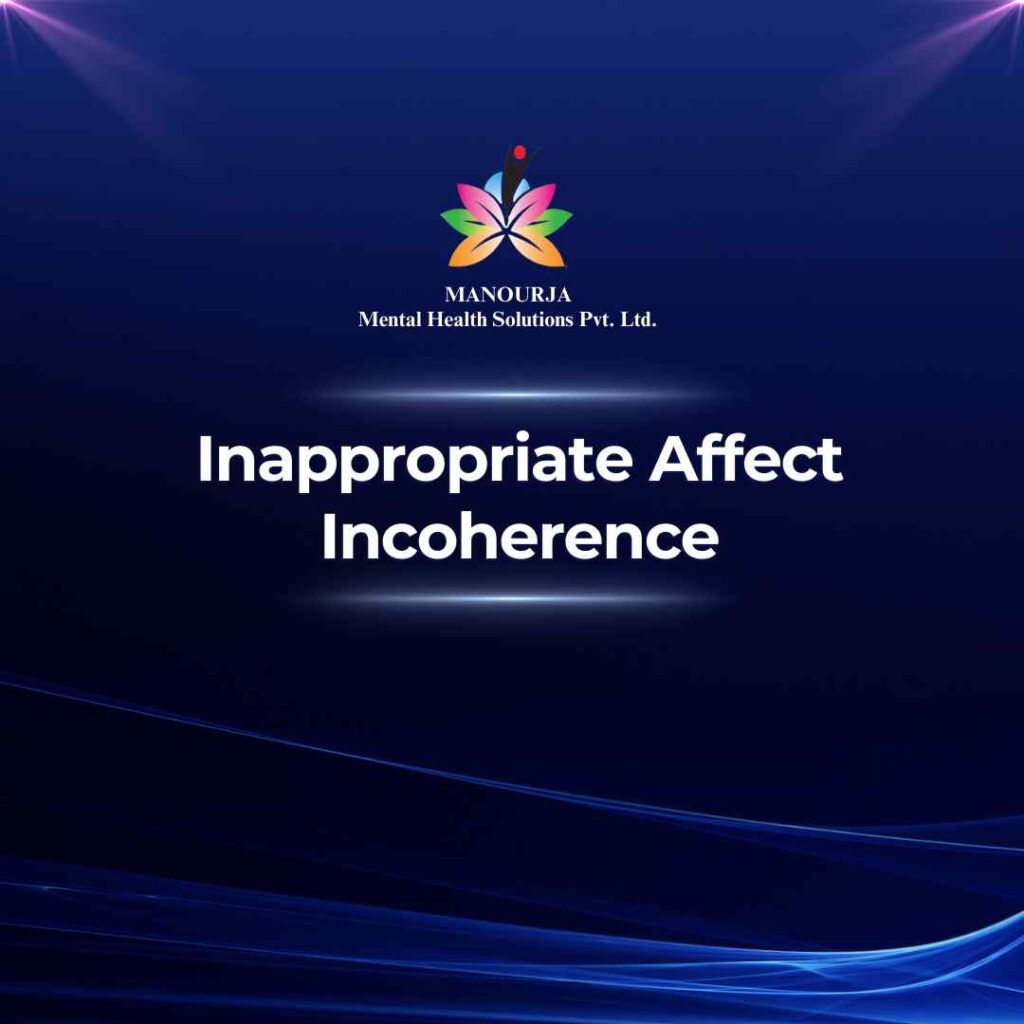Inappropriate Affect and Incoherence
Inappropriate Affect

Definition: Inappropriate affect refers to emotions or emotional expressions that are incongruent with the situation or context. This can manifest as laughing or smiling during a sad event, showing anger in a situation that doesn’t warrant it, or displaying flat affect (lack of emotional expression) when emotional responses are expected.
- Overreacting or Underreacting: Expressing emotions in a manner that is exaggerated or subdued compared to what is typical or socially expected.
- Incongruity with Context: Emotional responses that do not match the situation or are unrelated to the circumstances.
- Social Awkwardness: Difficulty in establishing or maintaining appropriate social interactions due to mismatched emotional expressions.
Associated Mental Illnesses:
- Schizophrenia: Inappropriate affect is a common symptom in schizophrenia, where individuals may exhibit emotions that are discordant with their internal experiences or external stimuli.
- Bipolar Disorder: During manic or depressive episodes, individuals may display inappropriate affect, such as excessive laughter or irritability, which does not align with the current situation.
- Autism Spectrum Disorders: Inappropriate affect can occur due to challenges in understanding social cues and norms.
- Borderline Personality Disorder: Emotional dysregulation in BPD can lead to inappropriate affective responses in interpersonal interactions.
Incoherence
Definition: Incoherence, also known as disorganized thinking or thought disorder, refers to disruptions in the logical structure or flow of thoughts and speech. It manifests as disjointed or incomprehensible speech patterns, making it difficult for others to follow or understand.
Signs and Symptoms:
- Loose Associations: Jumping between unrelated topics or ideas during conversation.
- Word Salad: Mixing words and phrases without forming coherent sentences.
- Tangentiality: Going off on tangents that do not relate to the main topic of conversation.
- Neologisms: Creating new words or using words in unconventional ways that are not understandable to others.
Associated Mental Illnesses:
- Schizophrenia: Incoherent speech is a hallmark symptom of schizophrenia, particularly during acute psychotic episodes.
- Mania: In manic episodes of bipolar disorder, individuals may exhibit pressured speech and tangential thinking.
- Severe Anxiety Disorders: Extreme anxiety can lead to racing thoughts and difficulty organizing thoughts coherently.
- Organic Brain Disorders: Conditions such as dementia or traumatic brain injury can cause cognitive impairments leading to incoherent speech.
Diagnosis and Treatment
Diagnosing inappropriate affect and incoherence involves careful clinical assessment by mental health professionals, including observation of behavior, interviews, and possibly neuropsychological testing. Treatment typically involves:
- Medication: Antipsychotic medications may be prescribed for conditions like schizophrenia to manage symptoms of inappropriate affect and incoherence.
- Psychotherapy: Cognitive-behavioral therapy (CBT) or supportive therapy can help individuals understand and manage emotions, improve communication skills, and enhance social interactions.
- Supportive Care: Providing a structured environment and teaching coping strategies to manage symptoms effectively.
- Educational Support: Educating individuals and their families about the nature of the symptoms and how to navigate social and interpersonal challenges.
Conclusion
Inappropriate affect and incoherence are complex symptoms that can significantly impact an individual’s daily functioning and social interactions. Early diagnosis and appropriate treatment interventions are crucial in helping individuals manage these symptoms effectively and improve their overall quality of life.
At MANOURJA, we believe in the transformative power of counseling. Our experienced therapists offer a safe and supportive space where you can explore your thoughts, emotions, and challenges. Through personalized counselling sessions, we’ll work together to develop coping strategies, build resilience, and achieve lasting positive change. Discover the path to a healthier, happier you with MANOURJA counselling services.
MANOURJA Rehabilitation Services
At MANOURJA, we’re dedicated to helping you in rebuild your life, after difficult times. Our rehabilitation services focus on understanding what you need to move forward, whether you’re recovering from addiction, trauma, or any psychological – social challenges. We create personalized plans, that are all about helping you, regain your strength and find hope again. With a caring team by your side, you’ll have the support to make real progress and take steps toward a brighter, healthier future.
